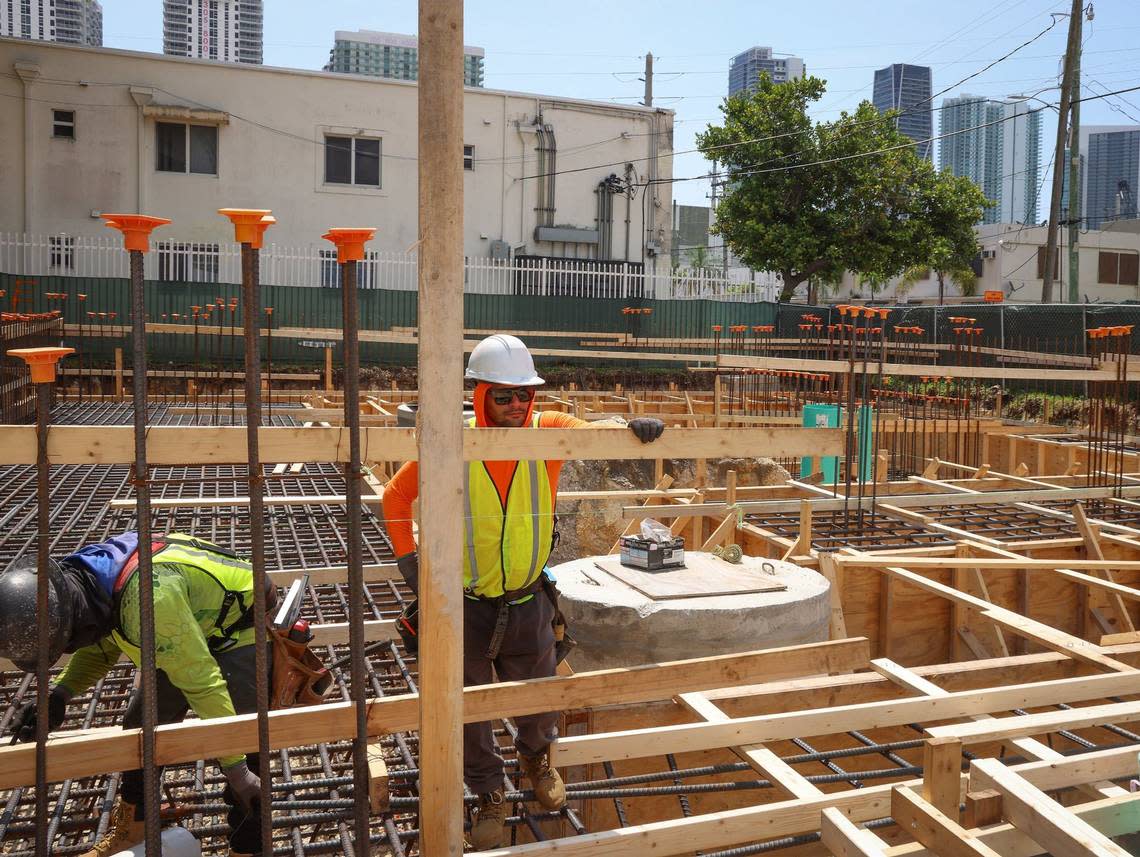Miami commissioners haggle over future of city agency caught up in bribery scandal

The future of a taxpayer-funded Miami redevelopment agency whose former chairman was arrested last year hangs in the balance after the City Commission on Tuesday delayed a vote that would have extended its existence for the next two decades.
Miami’s Omni Community Redevelopment Agency was founded in 1987 with a mission to reduce “slum and blight” in the city’s Omni neighborhood, just south of Wynwood. It’s run by a team of professionals, with a Miami elected official, typically the District 2 commissioner, serving as chairperson. The agency — which provides grants to small businesses, builds affordable housing and makes infrastructure improvements — is scheduled to end operations in 2030 if not granted an extension.
The commission’s hesitation on Tuesday to extend the agency’s life until 2047 came as a surprise to District 2 Commissioner Damian Pardo, the current chairman of the agency.
If the extension isn’t granted, Pardo said: “It would be bad for the area, bad for Miami, bad for our district all the way around, because we’re prepared in this moment to be able to enter projects that are really significant.”
The Omni redevelopment agency’s funding comes from property tax revenue generated within its boundaries. Its budget for the 2024 fiscal year is about $63 million. If the extension is granted, over $100 million could become available to support affordable housing and major infrastructure projects, according to Pardo’s office.
The agency’s previous chairman, former Miami City Commissioner Alex Díaz de la Portilla, was arrested in September on money laundering and bribery charges. Since then, Omni CRA employees have been working to right the ship. That includes an effort to revive a previously scuttled collaboration between the agency and Miami-Dade County Public Schools to build affordable housing and relocate a public magnet school, iPrep Academy, on city-owned land.
That deal was scrapped in 2022 in favor of a proposal from private school operators David and Leila Centner to build a “sports dome” on the same plot of land. Prosecutors allege that nearly a quarter-million dollars in Centner money was channeled to two political committees controlled by Díaz de la Portilla in order to secure his support for the project. Díaz de la Portilla was arrested on charges of bribery and money laundering in connection with the land deal; he has pleaded not guilty and denied wrongdoing.
The Centners, who were not charged with any crime, have also denied any impropriety. But after facing pushback from iPrep parents, the couple pulled out of the sports dome deal in March.
With the land now back up for grabs, Omni CRA Executive Director Isiaa Jones told the Miami Herald that her office has been actively working to revive the public school plan, including having multiple meetings with School Board consultants about the matter. But Jones said that extending the lifespan of the Omni agency is vital to making the public school plan, as well as other projects, happen.
“That would give us the funding to push forward on all the affordable and workforce housing that we need,” Jones said.
‘Horse-trading’
Pardo noted that in 2020, the Miami-Dade County Commission — which has oversight over the county property-tax revenue that helps fund the Omni CRA — had authorized an extension of life for the agency until 2047, saying that the process has been four years in the making and that the city had the “football at the goal line” Tuesday.
That was until the person who unseated Díaz de la Portilla in a November runoff raised concerns about the boundaries of the neighborhood that reaps the benefits of the agency’s funding.
District 1 Commissioner Miguel Angel Gabela made the case at Tuesday’s meeting that the boundary of the Omni redevelopment agency should be expanded west to the Allapattah neighborhood in his district because more resources are needed there. Gabela said he remembers in the ‘70s, ‘80s and ‘90s that the Omni neighborhood needed improvement but said that the area is now in better shape and that the financial resources of the agency should go to other parts of the city.
“Today, you know, I think this is a different scenario. ... I would argue that the majority of this area, now it’s prime real estate and therefore blight has gone away. Not all of the area, but the majority of the area,” Gabela said.
Although an independent redevelopment agency could theoretically be started to make similar improvements in Allapattah, he said the process could take a decade or more and would not address pressing needs in his district. Expanding the Omni redevelopment agency into Allapattah would be a quicker fix, he said.
“We need funds, OK? And we don’t need them in 10 years. We need them now,” Gabela said.
District 3 Commissioner Joe Carollo, who has had a contentious relationship with Gabela that included a near-brawl in January, agreed that there are “tremendous” areas of need in Gabela’s district, whereas the Omni boundaries include “very well-to-do areas.” He suggested bringing photos of the two areas for comparison when the item comes back before the commission.
Pardo accused his colleagues of engaging in “horse-trading” and countered that the commission has other avenues to fund improvements in Gabela’s District 1 that don’t require derailing the Omni CRA extension.
“These two things can happen, and it shouldn’t be used as political bartering at all,” Pardo said.
District 4 Commissioner Manolo Reyes was absent from Tuesday’s meeting. District 5 Commissioner Christine King agreed with Pardo, saying she supports creating a redevelopment agency in Allapattah and that it would be a “mistake” to hold up approving the extension of the Omni agency. But ultimately, Pardo fell short of a majority vote.
The City Commission is expected to revisit the agency’s extension at its July 25 meeting.

